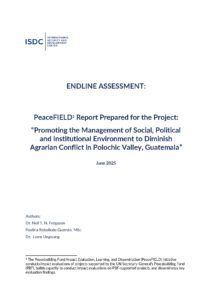For almost a decade, the UN Secretary-General’s Peacebuilding Fund (PBF), and its implementing partners, have worked in the Polochic Valley in order to address the causes of violence and to reduce its future incidence. In this work, we evaluate the effectiveness of a recent round of interventions, focused on improving the capacities of local dispute resolution via talking and mediation, working with WFP, FAO and OHCHR to implement these interventions.
According to our analyses, the PBF-supported project in the Polochic Valley addresses key needs, locally. The communities that have received support suffer high levels of deprivation; high levels of stress-related indicators, more generally; have insecure land rights; and, in many instances, have faced evictions from lands on which they had previously lived and worked. Despite this, we also see that expectations towards local and national dispute resolution dialogue is overwhelmingly positive, with a vast majority of respondents at both baseline and endline thinking such approaches are both appropriate and effective. By contrast, while attitudes to violence are more mixed, individuals still tend to view it as an effective, although not appropriate way, to resolve disputes. In this context, “violence” encompasses a range of actions—including physical confrontation, intimidation, and threats, as well as protest and acts of resistance—but does not extend to armed or organized lethal force. Consequently, for the intervention to work, it would be through changing these attitudes towards violence. Our results show that individuals who receive information about the intervention both before and after it was implemented were the least likely to view violence as an appropriate way to resolve disputes after the program had ended. This suggests that providing consistent information throughout the intervention can help shift attitudes in lasting, positive ways.
This analysis is based on rigorous quantitative methods and bespoke survey data collected from remote, indigenous, populations in the Polochic Valley. Embedded “experiments”, where the nature of information was randomized between survey respondents and rounds, allows us to understand how variations thereof within the supported areas in Polochic Valley can induce different post-implementation attitudes and, potentially, associated behaviors. Due to the nature of the data collection and methods used, this stops short of fully attributable average treatment effects present in more standard impact evaluation methodologies but still allows us to show some of the positive outcomes associated with the intervention.
Publication Details
- Year of Publication: 2025
- Region/s: Latin America & Caribbean
- Theme/s: Impact Evaluation · Micro-Data Collection · Violence & Peacebuilding
- Research Topic/s: Institutions & Fragility · Peacebuilding & Reconstruction · Social Cohesion · Trust and Prosocial Behaviour · Violence & Conflict






